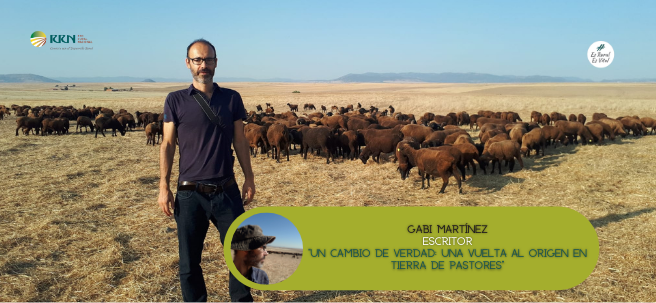
22 de September de 2020
Dinamización rural
Resiliencia y competitividad
Gabi Martínez (Barcelona, 1971) is a writer of travel books – a genre he claims “because some of the most outstanding books of Spanish literature, Cantar de mio Cid and Don Quixote, belong to this genre” – who has traveled along the Chinese coast, the Great Barrier Reef in Australia, the Nile and the Hindu Kush in Pakistan… until reaching the Extremaduran pastureland.
- The National Rural Network speaks with writer Gabi Martínez, who learned and practiced the shepherd's trade to write his latest novel, "A Real Change."
The reason for landing in "The Siberian Extremadura" is due to a reconciliation with his past, more specifically with the origins of his mother, Eloísa (born in Agudo, La Mancha, but raised in Sanjuanilla, Badajoz), who, after growing up in a family of shepherds, had to emigrate to Barcelona. In this return to his family's past, Martínez cared for a flock of more than 400 sheep for six months. And the fruit of this experience: " A true change: a return to origins in the land of shepherds" (Seix Barral).
National Rural Network: Has the pandemic and lockdown changed the perception of the rural world?
Gabi Martínez: The current situation has revealed that the primary and tertiary sectors exist in that order for a logical and natural reason. The pandemic forces us to rethink the order of these sectors again, because it's the people who work in the countryside who keep people in the cities alive. The relationship with the city is no longer one of love, because we've realized that in Spain we still have a long overdue conversation about love with the countryside.
RRN: What would this new conversation between the countryside and the city consist of?
GM: It's about changing the narrative . Changing the way we've viewed the countryside until now. A bucolic, poetic, romantic view... but also an impoverished one. The countryside has been perceived as poor because the city has said it was, but it's not true. We need to re- empower the countryside.
RRN: Have you learned traditional knowledge of the rural world during your experience?
GM: Many. One of them is that you don't have to worry if a sheep escapes because it will return within two days. Also, it's better to dock sheep's tails early for fly season. It's also very interesting to see how the flock avoids certain poisonous plants. And to discover that there are wood storks that live in the dehesa...
I also explain in the book the “clock technique” that you should use if you come across a wolf on the path it takes with its cubs: you should slowly turn your body clockwise – your torso at the same time as your feet – speaking very slowly and quietly and start turning your back on the wolf, but without ever losing sight of it out of the corner of your eye.
RRN: In the book you make a series of rural claims after the experience lived
GM: Indeed, this return to my roots has made me realize certain forgotten realities that need to be vindicated in our new rural discourse. As a shepherd, I vindicate the figure of the black Merino sheep , which, while once numerous, soon became obscured because white wool could be dyed in numerous colors while black wool could not. I also want to vindicate the figure of the extreme dehesa , a patriotic space where the pending "great conversation" proposed by Thomas Berry is possible. The Extremadura dehesa is one of the places in the world with the greatest biodiversity. In fact, I vindicate it as my own brand. And I call for an empowerment of the countryside , a new narrative about it, not one of poverty or compassion, but of collaboration between humans, nature, and animals, in which it is entirely possible to profit from it and from them without having to deplete resources.
RRN: Paraphrasing your book, where is the real change we need today as a society, even as a civilization?
GM: In the change of narrative, of discourse. Words and discourses create realities, and when these don't serve us, impoverish us, and debase us, we must change them in order to empower ourselves. To change, you have to believe you're capable of truly changing. And that's happening now. It can be seen. But it will only be achieved if you resist until the end. For change to be true, you have to resist until the end and not just remain in the attempt and the gesture. It's necessary for citizens and institutions to simultaneously create a new discourse. And for it to be brought into the new reality.









